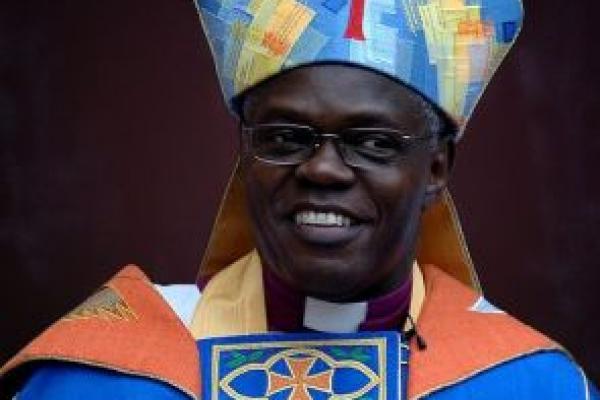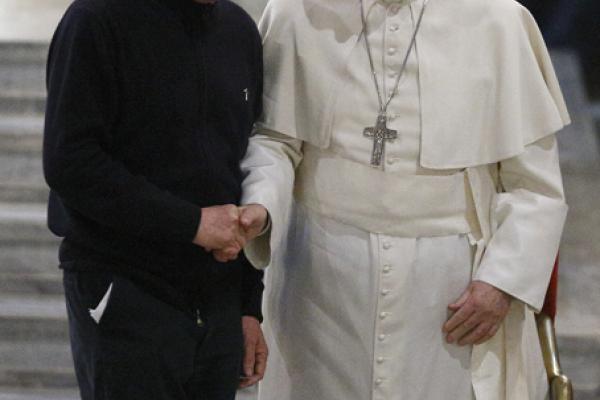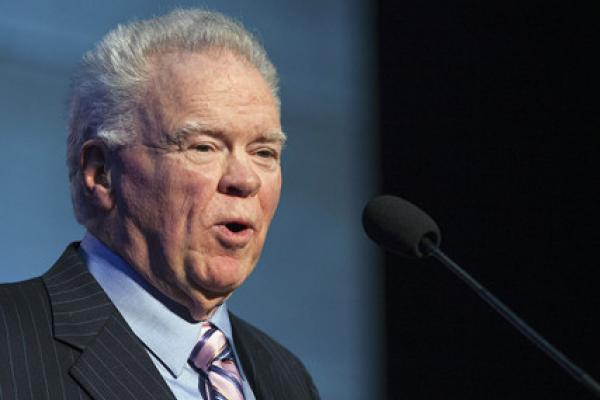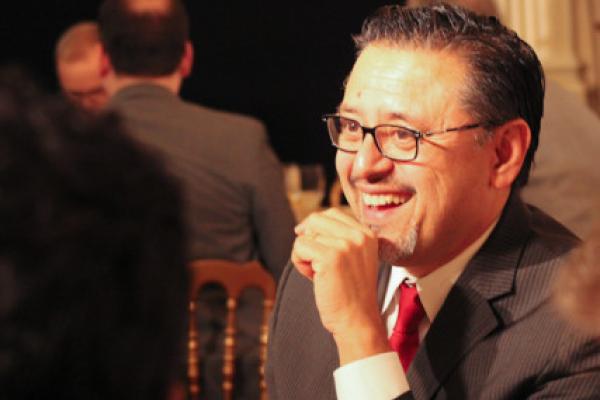There is an ancient Sanskrit mantra — Annam Brahma — which Indian sages and seers of the hoary past uttered before taking their daily bread. That mantra, which originated thousands of years ago, is translated as “Food is God.” The modern Indian mystic Sri Chinmoy said, “Food gives us new life; it energizes us. Anything that energizes us is life — the stream of life — and life is God.”
This mantra suggests that without food, men and women would not have the energy to pursue their quest for the truth, for light, for God. Food enables our journey to self-discovery and God-discovery. Therefore we are grateful for our food, for it takes us home, to our Source.
Nearly every faith tradition places a spiritual significance on food — from animist religions that celebrate the harvest to Christianity’s taking of the sacrament —symbolizing the sacrifice of Jesus. We link these ritual acts of feeding our bodies to the feeding of our soul through gratitude and remembrance.
It is incredibly apt that this year’s Food Day is dedicated to farmworkers, who occupy the invisible base of our nation’s food system. I use the word “invisible” because if we truly comprehended the abuse they endured, both spiritual and physical, we would rise resolutely in defense of their rights.
Anglican priests should no longer be bound by the centuries-old principle of confidentiality in confessions when they are told of sexual crimes committed against children, the Church of England’s No. 2 official said.
Speaking at the end of an internal inquiry on whether senior church officials ignored abuse allegations involving children, Archbishop of York John Sentamu said that “what happened was shameful, terrible, bad, bad, bad.”
He said that the Church of England must break the confidentiality of confession in cases where people disclosed the abuse of children. “If someone tells you a child has been abused, the confession doesn’t seem to me a cloak for hiding that business. How can you hear a confession about somebody abusing a child and the matter must be sealed up and you mustn’t talk about it?”
Half a dozen men stand nonchalantly in front of a grubby building on one of Rome’s busiest streets as cars whizz past. They stiffen whenever a stranger approaches.
But few would guess they’re undercover cops protecting Italy’s most endangered man.
Inside is the Rev. Luigi Ciotti, a 69-year-old priest with soft brown eyes and silver hair who has spent the past 20 years fighting the Italian Mafia.
He runs an organization called Libera, which means free. It’s become a household name because of its efforts to fight criminal organizations, to support victims and to redevelop land confiscated from mob bosses.
Yet Ciotti says there is still a lot more to be done.
“I dream of a country where every person, every citizen wants to assume their responsibility. On that day the Mafia and corruption will cease to exist,” he said in an interview.
Ciotti has had police escorts before, but when a notorious Sicilian boss named Toto Riina issued a death threat from his jail cell a couple of months ago, the authorities immediately doubled Ciotti’s protection.
The trustees of Southwestern Baptist Theological Seminary have affirmed the school’s president, Paige Patterson, after investigating his decision to admit a Muslim student into the school’s Ph.D. program.
Patterson, one of the most revered Southern Baptist figures and an architect of the conservative resurgence of the Southern Baptist Convention a generation ago, faced heavy criticism from some Baptists who accused him of violating the standards of his school in Fort Worth, Texas.
“We join with our fellow Southern Baptists in appreciation for and admiration of the evangelistic heart of our president, Paige Patterson,” the trustee board said in a statement Oct. 22 as it concluded its fall meeting.
“Any violations of the seminary bylaws were done in a good-faith enthusiasm to pursue the seminary’s purpose, as set forth in its articles of incorporation.”
The trustees have closed their investigation, and Patterson explained after the meeting that the Muslim student, Ghassan Nagagreh, is no longer enrolled at the seminary.
They say you can feast like a king, and now you can eat like a pope after a young chef from the Vatican’s Swiss Guards published a cookbook featuring the favorite recipes of Pope Francis and his predecessors.
David Geisser, 24, who joined the elite Vatican security corps only a month ago, released his book, titled “Buon Appetito,” in Rome on Oct. 21.
The cookbook includes recipes for Francis’ favorite dishes, such as empanadas; roast sirloin, known as “colita de cuadril”; and “dulce de leche,” a milk-based Argentinian dessert that began appearing on Vatican dining tables when the archbishop of Buenos Aires was elected pope last year.
But it also features one of St. John Paul II’s favorite dishes, Polish pierogi, or stuffed dumplings, and Bavarian delicacies favored by Pope Emeritus Benedict XVI.
An alliance of evangelical organizations has pledged to dramatically increase the number of church-based legal clinics across the country to assist immigrants with the complicated processes of seeking green cards, visas and family unification.
The Immigration Alliance, a network of 15 evangelical denominations and ministries, on Oct. 21 launched a plan to reduce the gap between the 22 million immigrant noncitizens and the 12,000 private immigration lawyers in the country.
“Churches are a trusted presence in immigrant communities that can — and should — help address this critical shortage of legal services,” said Noel Castellanos, the alliance’s board chair and the CEO of the Christian Community Development Association, in announcing the new venture.
The alliance, which was formed in 2013, estimates that there also are 2,800 nonprofit attorneys and accredited staff in the country. The umbrella network includes the National Association of Evangelicals, the Assemblies of God, the Church of the Nazarene and the National Latino Evangelical Coalition, among others.
Editor's Note: Global warming means rising sea levels, worsening extreme weather events, and a threat to God’s creation and people. The world has not experienced normal global temperatures since 1985. So while some might call them millennials, anyone under the age of 30 is part of the “Climate Generation.” If you’re under 30, congrats! You’ve inherited a big problem. Dorothy Boorse is a science professor, a Christian, and a parent, and she has some words for the Climate Generation.
Dear younger ones. You idealistic, smart, and entrepreneurial folks, take courage! I am speaking from an earlier generation, but one with you, caring for each other and our lovely world. I have two sons: one home-grown in the more common way, and one gained through a long process I often call “my paperwork labor.” For one of them, I ate for two, then sweated and yelled in an epic battle to get him out into the world. For the other, I had certificates of health and finances and assessments printed, travelled abroad, and got my husband to write an autobiography. Both were arduous journeys, and both of my sons are loved more than I can describe.
Yesterday a gunman opened fire in Ottawa and killed a soldier at a war memorial. It is a stark reminder of the kind of world we live in every time a life is taken through violence. My prayers are with the victim and his family and for the authorities leading the investigation in trying to understand the shooter’s motives.
Like Ebola and ISIS, the shooting is spreading fear around the world. It is not unnatural to experience fear as a reaction to danger. However, reacting out of fear instead of wisdom is the mistake we must stop making.
What happened in Ottawa is also a reminder for me that while we can’t remove all violence, we can take steps as a country to reduce it. In 2011, the last year complete numbers are available, 32,163 died in America due to gun related deaths. In Canada that same year the number was 781. While gun violence can happen anywhere, as Ottawa shows, it happens much more in the United States than any other developed country.
Why the discrepancy? The full answer is complicated, but one of the driving factors is not.
A Sandy Hook Father’s Plea from Sojourners on Vimeo.
Lonely Planet just ranked Washington, D.C., as the #1 Best Place to Travel in the world(!). Coming on the heels of Forbes crowning D.C. the coolest city in America in August, the admittedly unexpected parade of accolades appears to just be starting for the place Sojourners has called home for the past few decades.
Of course, “coolness” is elusive by nature — if it was measurable, it wouldn’t be cool — and the metrics used by both outlets are questionably desirable, if technically true for a portion of the city. Lonely Planet points to a city “whose official religion is national politics,” while Forbes lists “higher influxes of new people” and “most college degrees per capita.”
This shows a problematic tendency to weight Washington the industry over D.C. the city (this post from DCis toutlines that nicely). It also largely misses what’s actually great about this place. I’ve found D.C. to be far beyond the House of Cards-meets-Cherry Blossom Festival sketch beloved by press and many residents alike. In my daily experience, D.C. is collaborative, generous, and deserving of accolades in ways that continually surprise.
Based on my very unscientific metrics of personal observation and emotional investment, here are a few things that are uniquely great about D.C.
I was asked to contribute a chapter to a new book called Disquiet Time: Rants and Reflections on the Good Book by the Skeptical, the Faithful, and a Few Scoundrels. The volume, an edited compilation put together by Cathleen Falsani and Jennifer Grant, takes on many of the weird texts in scripture that we either gloss over or completely ignore because they’re just too … well, weird.
Of course there are plenty of spiritual oddballs to choose from, but as soon as I got the invite, I knew I wanted to write about the book of Revelation (note that there is not “S” at the end; there is no such book as Revelationsssssssss in the Bible). Suffice it to say that my relationship with the last book in the bible is a little bit complicated. In fact, it ruined my potential career as a lifetime Baptist. A number of you may have heard bits or pieces of the story about how I got kicked out of church as a teenager, but may not know all the details.
Well kids, you can blame it all on one freaky Bible book, one intransigent teenager and a floppy-Bible-wielding youth minister. But although the experience pushed me out of church for a solid decade, it didn’t forever ruin my search for the divine. But this particular story isn’t about that. It’s about how I got one particular youth minister so red-faced and flustered that he cussed me out and almost hit me square in the noggin with the Good Book.









